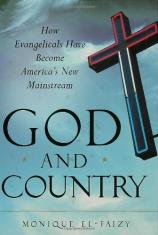God and Country: How Evangelicals Have Become America's New Mainstream
Review
God and Country: How Evangelicals Have Become America's New Mainstream
One of my frustrations as a journalist, and an evangelical with centrist leanings, is the shallow understanding of evangelicalism on the part of the media --- and therefore, the inaccurate, stereotyped and often caricatured view of evangelicals that the media portray. It never occurred to me that I should write a book, something of a primer on evangelicalism for a secular audience, to set the record straight. Now I don't have to, because seasoned journalist Monique El-Faizy has done just that in GOD AND COUNTRY.
From page one, El-Faizy demonstrates that she has a firm grasp on the realities of the evangelical world. An evangelical until her college years, El-Faizy has retained --- or perhaps more accurately, regained --- a healthy respect for the spiritual movement she left behind. "I have come to know evangelicals who are genuine, interesting, intellectually curious, and engaged with the world in which we all live," she writes, and for that sentence alone, evangelicals everywhere should express their heartfelt gratitude. They "cannot be painted with…a broad brush," she continues several pages later. "They are more diverse, and, in many areas, more moderate than those outside of the fold realize, which is why they have become so influential." Can I hear an "Amen"?
El-Faizy admits to a one-time bias against evangelicals, but it was just that perspective that enabled her to see the same prejudice among her media colleagues. In setting out to investigate this national religious phenomenon --- the rise of evangelicalism in every area of American life --- she left no spiritual stone unturned. Not only did she visit some of the movement's most prominent churches, she also did a thorough examination of such areas as the publishing industry, music and film, pop culture, academia and the home schooling movement.
Among the churches she visited over the year she spent working on the book were Without Walls in Tampa, FL, where Paula White, friend to the homeless as well as Donald Trump, preaches "as if she is channeling Aretha Franklin"; Chuck Smith's Calvary Chapel in Costa Mesa, CA, whose legacy of involvement in the civil rights movement in the 1960s continues today with programs for providing affordable housing and drug rehabilitation; and Bill Hybels's mall-like Willow Creek Community Church in South Barrington, IL, where "the down-to-earth attitude feels more authentic than forced," she writes.
El-Faizy also looks at the changing nature of evangelism itself, one of the hallmarks of the movement. Accustomed to the kind of evangelism that felt more like an "ambush" in her earlier years, the author discovers that evangelicals today are more likely to share their faith in subtle ways that place their genuine personal relationships above the expectation that their friends and neighbors will make an immediate decision for Christ. Finally, the author gives some ink to the emerging church movement, which just may hold the key to the future survival of evangelicalism in an increasingly secularized society. In that section, she discusses the impact of Erwin McManus, whose L.A. church, Mosaic, was the first "genuinely hip" place she found; Brian McLaren, undisputed "leader" --- though he eschews that title --- of what he calls the emerging conversation; and "laid-back surfer type" Spencer Burke, who manages a popular website.
El-Faizy gets high marks for her thorough and largely accurate look at evangelicalism. She makes one unfortunate misstep in writing that evangelicals believe in predestination. Well, they do and they don't, which is where an understanding of theological nuances is critical. Without getting all academic here, let's just say that when most people hear "predestination," they think of its narrowest meaning --- that God has predestined individuals to spend eternity either in heaven or in hell. Most evangelicals definitely do not believe in that kind of predestination.
Aside from that, El-Faizy shows remarkable insight and understanding. Readers outside the evangelical world can learn a great deal from GOD AND COUNTRY; readers inside that world need to thank God, shout hallelujah and give El-Faizy an "attagirl" for her excellent research and depth of understanding.
-
Reviewed by Marcia Ford on November 13, 2011




